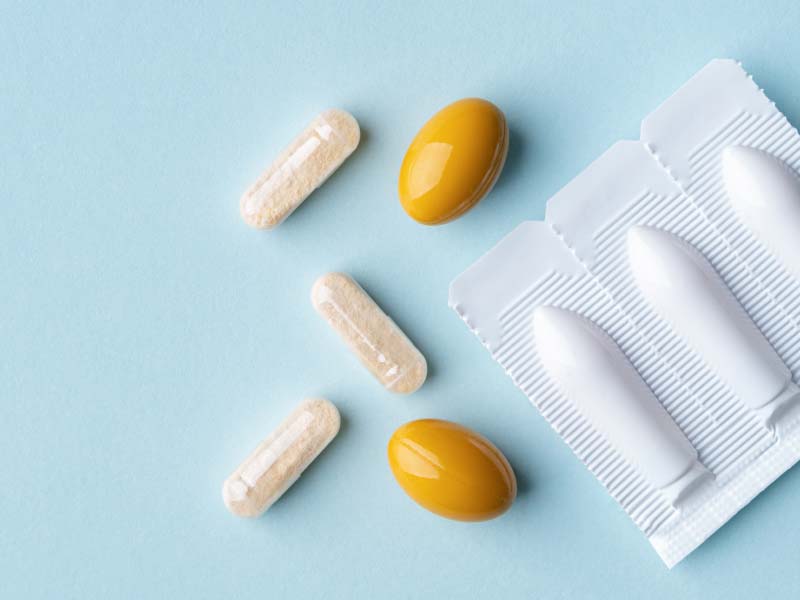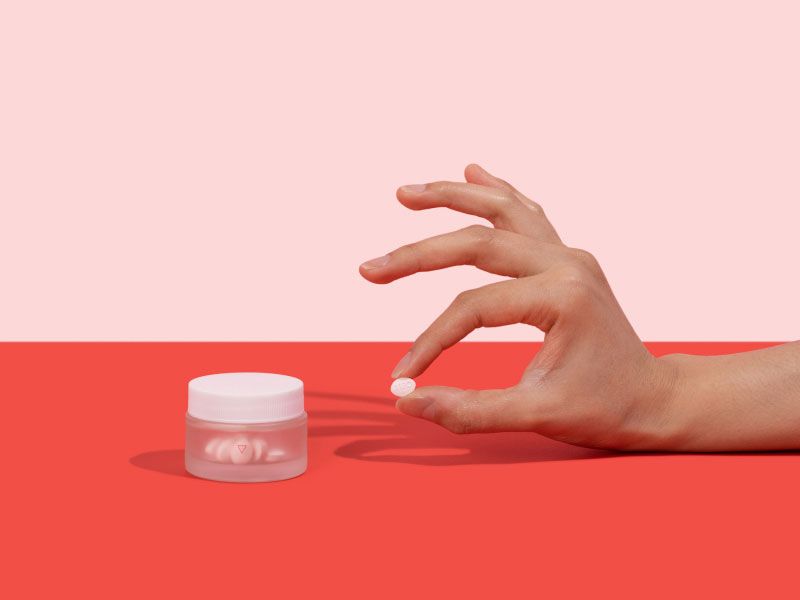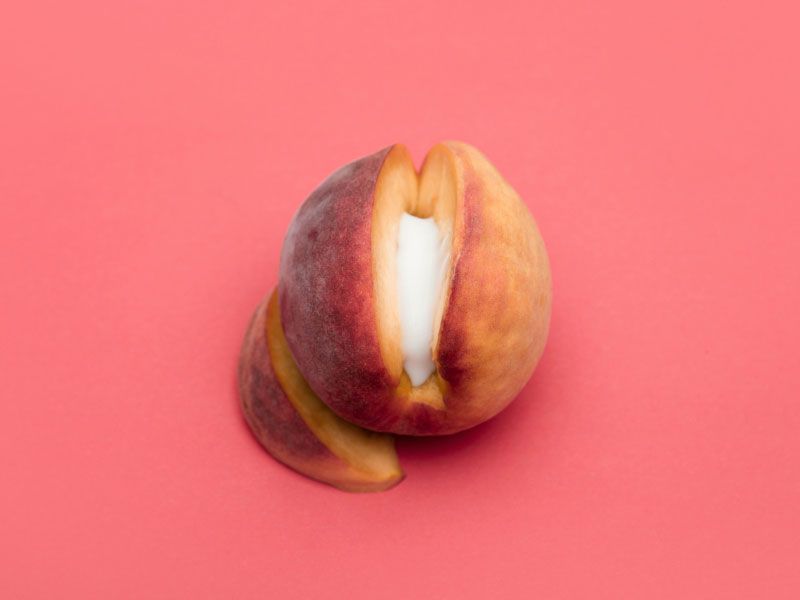
Can You Have Sex With
A Yeast Infection?
Published on April 25, 2021
Updated on April 11, 2025
Written by Kathleen Morrison
Medically Reviewed by Andrea Sleeth WHNP-BC, MSCP
Wondering if it’s okay to have sex while dealing with a yeast infection? The quick answer: it's not a hard “no,” but it might not be the most comfortable option. Yeast infections can cause irritation, itching, and discomfort—definitely not the ingredients for a fun time. Plus, sex can sometimes make things feel worse or slow down healing.
The best thing you can do is listen to your body and check in with yourself. If you're unsure, a chat with a healthcare provider can help you figure out when it’s the right time to get back to the fun stuff without those annoying symptoms in the way.
Can You Have Sex While You Have a Yeast Infection?
A lot of people wonder whether it’s okay to be intimate when dealing with a yeast infection. It’s a fair question—nobody wants to make symptoms worse or pass along discomfort to a partner.
While yeast infections aren’t classified as sexually transmitted infections (STIs), sex can sometimes make things more irritating or even potentially spread the infection. Everyone’s body reacts differently, so the best choice depends on how you’re feeling.
For some, waiting it out can speed up healing and ease discomfort. Others might be comfortable with gentle intimacy as long as they listen to their bodies.
Is it safe to have sex with a Yeast Infection?
So, is it okay to do?
Some people choose to have sex even when symptoms are mild. While it’s technically possible, it can lead to more irritation. It’s safe, yes, but not super comfortable.
Think of it like scratching a healing bug bite—it might not seem like a big deal at first, but it can leave you feeling worse afterward. Friction during sex can make itching or swelling more intense, and for some, it can lead to lingering soreness.
There’s also a small chance of passing yeast to a partner, though it’s not super common in healthy adults. Open communication is key. If there’s any doubt, waiting until treatment is done and symptoms are fully cleared can be the best move for both partners.
How sex can affect your symptoms
When yeast overgrowth is already in play, sex can add extra pressure to sensitive tissue. Blood flow increases in already irritated areas, which can lead to even more inflammation.
Even with condoms, friction can still be uncomfortable. It’s like running on a sprained ankle—you can do it, but it might worsen things. Checking in with yourself and your partner throughout can help keep discomfort from escalating.
If symptoms flare up mid-moment, it’s probably best to press pause and let your body rest. No one wants a quick session to turn into a week of irritation.
Risks of Having Sex with a Yeast Infection
Being intimate while dealing with a yeast infection can bring some unexpected challenges. A little itching might not seem like a big deal, but friction and moisture can make symptoms worse instead of better.
While yeast infections aren’t classified as sexually transmitted infections (STIs), the fungus can still sometimes transfer between partners. That could mean a longer healing process—or an unexpected trip to the pharmacy. Weighing short-term fun against long-term comfort can help guide the best choice for you and your partner.
How sex can make symptoms worse
When a yeast infection is already causing irritation, adding movement and pressure can turn mild discomfort into full-blown pain.
It’s like poking at a bruise—the more you mess with it, the worse it gets. Continued irritation may also slow down the body’s natural healing process, leading to symptoms that stick around longer than necessary.
Some people try to push through, but that can lead to increased swelling or even small tears in the skin. Giving your body time to recover can often be the fastest route back to feeling good again.
Can you pass a Yeast Infection to your partner?
Yeast infections aren’t considered STIs, but they can spread through intimate contact, even though it’s rare.
If a partner picks up the fungus, they might notice redness, itching, or general discomfort. While symptoms tend to be less common in men, nobody wants an unwelcome surprise. Honest conversations help both partners stay on the same page.
If either person prefers to hold off on sex until everything clears up, that decision can ease stress and eliminate any worries about passing symptoms back and forth.
How long after a Yeast Infection can you resume sexual activity
Deciding when to get back to business takes a little patience. Once the itching and discharge settle down, you might feel ready to ease back into things—but jumping in too soon could make symptoms flare up again.
Giving your body time to fully recover lets prescription treatments do their job and helps avoid unnecessary discomfort. The right timeline varies depending on the type of medication used. Oral treatments often work quickly, while creams or suppositories may take a few extra days. Paying attention to lingering soreness is a helpful way to gauge when it’s time to reconnect with your partner.
How long does treatment take?
Luckily, it's pretty quick and simple to treat yeast infections. Prescription Fluconazole usually ranges from single-dose options to full-week regimens. Some people notice relief within a day or two, but finishing the full course is important. Stopping early could leave behind just enough yeast for symptoms to return.
If your care plan doesn’t seem to be working, a check-in with a healthcare provider can help rule out other causes or determine if a stronger prescription is needed. Sticking with the full treatment plan gives your body the best chance to move forward comfortably and confidently.
Wisp treatment options are available only after consultation with a licensed medical professional. You should consult with your healthcare provider before starting a new supplement or treatment regimen. Individual results may vary.
Signs you’re ready to get back to it
Getting your yeast infection diagnosed and treated is the first step. You’ll know things are back to normal when:
- Itching, redness, and discharge are completely gone
- The area looks and feels like usual, without irritation
- Daily activities—like walking or using the bathroom—aren’t triggering discomfort
- You’ve had a few days of peaceful rest with no lingering soreness
If everything feels back to baseline, you’re likely good to go. Taking things slow and checking in with your body can help ensure a comfortable experience. If you’re unsure, reaching out to a provider can offer extra reassurance. Waiting just a little longer can help set the stage for stress-free, enjoyable intimacy.
Keeping Yeast Infections at Bay After Sex
Once the symptoms of the infection have cleared up, it’s natural to want to keep things comfortable down there.
Building a routine that supports your vaginal health is a great way to stay feeling your best. It’s not about one magic fix but a combination of small habits that help maintain balance. Little changes—like choosing breathable fabrics and taking gentle care of your body—can make a difference.
Feeling free from discomfort is totally worth the effort, and it doesn’t have to be complicated.
Simple tips to support vaginal health
- Wear breathable fabrics: Cotton underwear lets the area breathe, which helps keep moisture at bay.
- Change out of sweaty clothes quickly: After a workout or hot day, swapping out damp clothes can help.
- Avoid scented products: Scented soaps, douches, and sprays can mess with your natural balance, so it’s best to steer clear.
- Stay hydrated: Drinking plenty of water helps keep your whole body in balance, including your vaginal tissues.
- Try a gentle home remedy: Some people find mild relief from a baking soda bath, but check in with a healthcare professional if symptoms linger or return often.
The role of personal hygiene
Keeping things clean doesn’t mean over-scrubbing or using harsh products. In fact, over-washing can disrupt the good bacteria your body needs.
A simple rinse with warm water is usually enough for most people. If you do use soap, go for a mild, unscented option. When drying off, pat gently instead of rubbing to avoid irritation. Showering or rinsing before and after sex is a great way to help remove sweat or potential irritants. Think of it as giving your skin a chance to breathe.
While there’s no one-size-fits-all solution, a little mindful hygiene and taking good care of yourself can go a long way, especially if you're dealing with repeat yeast infections or other issues. These simple practices support your body and help you feel comfortable and confident.
Finding Relief and Self-confidence
Listening to your body is key when dealing with a vaginal infection. Taking a break from sex or exploring other ways to connect can help speed up healing and also avoid passing the infection to a partner.
Once the symptoms ease up, gradually easing back into intimacy can make things easier and take some of the pressure (and stress!) off. If you’re dealing with recurrent infections or have questions about recovery, reaching out to a healthcare professional is always a good step.
At Wisp, we offer discreet, judgment-free sexual healthcare to help you get the care and answers you need, free from barriers. By staying patient, following a reliable treatment plan, and keeping communication open, relief is within reach—and you can feel confident in your well-being.
This blog post is for informational and educational purposes only and should not be taken as professional advice. Always consult with a qualified professional before making any decisions based on the information provided here.




